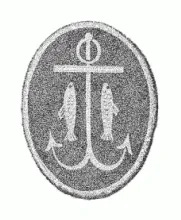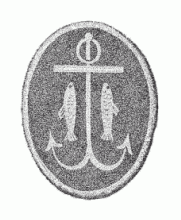I, Adamantius, am a seaman. It is all I have known. I am servant of my exercitor navis, who has the rather arrogant name of Pompey. When he calls the sea Mare Nostrum, he seems to mean it.
I don't think it is our sea, I think it is God’s, but I love it anyway. Its wonders fascinated me as a child. My father was not a seaman; he grew olives by the coast, and kept goats. But I dreamed of sailing the world, and hired myself out as soon as I could. With few exceptions, I have not regretted it. I have seen Leviathan play. I have been tossed by monstrous waves, and delivered from evil plights several times in my career. But, the money is good, and I love to see the wonders of the world.
Last week our corbita concluded its most interesting charter yet. We usually carry amphorae, and our hull is fitted for such. But a Centurion chartered us for a singular voyage to deport political prisoners to Patmos. Pompey usually doesn't deal in man flesh, but the price was too good for Pompey to pass up, good even enough for a minor refit. Apparently, there is profit to be made in prisoners. The winds this time of year were not ideal, but not as bad as winter.
It was the year of the Consulship of Nerva and Vestinus. Nero was consumed with the poisoning effect of foreigners upon the blood of Rome. So he had thousands of foreigners arrested. If some of the foreigners happened to be Romans, that left Nero unbothered. Poison is poison. The big poison, of course, was this sect of Jews worshiping Jesus bar Joseph. His laws, apparently, contradicted Rome's.
The deportees were from Palestine, and were joining a famous Jew in Patmos, named Ioannes, who had already been exiled the year before. They were a mixed lot of both Jews and Greeks. Mostly poor, but one rich man among them. Most had been honest men, but some had been ne'er do wells. A couple had been sold to repay debts. One had been a sailor, like me. They were all Christians.
I knew well of their Kyrios. His crucifixion was well known; it happened around when I was born. I had traveled to his temple in Jerusalem on an errand from Jaffa once; maybe twenty years ago. Pompey had bid me visit, even granted me an extra day. He seemed to believe in this man who claimed to be God. But Pompey always hedged his bets. He kept a few other gods on the side.
A crewmate had gone with me, but like many sailors, he was just interested in the whores. He was fun to drink with for an hour, but not much fun after that. We parted company and promised to meet up the next morning to return.
The temple had been impressive. Pompey had given me a small bonus, ostensibly for whores, but I spent it on a dove for sacrifice. The prices were outrageous, twice what I would pay for a dove in town. But rules are rules.
My mother had me circumcised as a baby. She feared God, and so did my father, but they weren't Jews. On that basis, I forged ahead into the court of men. There were stern warning signs everywhere, but there was no guard to check my mentula. I wanted to sacrifice so badly that even if there had been a guard, and even if I were uncircumcised, I might have fought him to get in. I didn't just want my sins atoned for, you see. I could sacrifice in the outer court, but I wanted to be a Jew. My mother had told me of what Jesus had said… “men are forcing themselves into the kingdom of heaven.” I wasn’t really a Jew, well, only in my missing foreskin I guess, but that to me seemed quite insufficient. I knew men who measured their whole lives by their mentula, and I didn’t want to be like that.
I found a small group of believers and we shared a meal at midday after temple. Some of them were like me; mere would-be Jews, but some were real Jews. Their love was palpable. I had never known it; my mother and father were too scared to attend synagogue in Jaffa, things were too fraught at that time, with those great friends, Pilate and Herod. Things seemed too political to be a Jew, so our belief was kept in-house, and we kept to the society of the rank pagans. Most of what we knew from the Law and Prophets we knew anecdotally, and news of Christ himself was by gossip mostly.
There was a prominent man in that friendly group twenty years ago in Jerusalem. He had known Cephas before he left Jerusalem. “How many of you are there?” I had asked him. “Not many left”, he replied. “You saw the abominations in temple. You see how bad things are? Christ told us we need to sell our houses here and leave. Many of us have already, and gone to Rome, or other cities. As bad as things are elsewhere, with the zealots here, we get caught up and false witness is brought against us for being murderers and other things. I myself am planning to leave next year.”
Well, like a sailor, I am rambling. Back to my story, forward twenty years, to the present.
We dropped off the Christian prisoners in Patmos. From there, we took a passenger, named Dionysios, for for an onward passage to Rome herself. He had met Ioannes, and was carrying a letter from him! Between watches on deck I asked him to share the contents. This passage struck me with great force:
“Every sea captain, and all who travel by ship, the sailors, and all who earn their living from the sea, will stand far off. When they see the smoke of her burning, they will exclaim, ‘Was there ever a city like this great city?’ They will throw dust on their heads, and with weeping and mourning cry out: Woe! Woe to you, great city, where all who had ships on the sea became rich through her wealth! In one hour she has been brought to ruin!’ “Rejoice over her, you heavens! Rejoice, you people of God! Rejoice, apostles and prophets! For God has judged her with the judgment she imposed on you.”
“What does it mean?”, I asked Dionysios.
“The hour is almost upon Jerusalem”, he replied. “All of the blood of the righteous, from Abel onward, will be visited upon the heads of the rulers there. The gaudiness and fakery of Herod’s temple, with its luxury, will be torn down and the whore will be slaughtered for her adultery. The Lord will take his real bride.”
“I’d better let Pompey know about this”, I opined. “Sounds like it may cut into his business.”
“I wouldn’t worry about it”, said Dionysios. “The Lord has plenty other work for sailors. His bride has inherited the entire world, you see. Nero is Christ’s servant now. See all of these imperial ships in this traffic lane? They serve Jesus. They are doing his will, even when they think they are opposing him. Nothing has changed, but everything is bigger now.”
Passover was approaching, but Pompey wasn’t enough of a Christian to make landfall to celebrate it. He invoked whatever god he needed to accomplish the task at hand. There were schedules to meet, so the altar under the poop deck had Mercury on it this week.
Dionysios and I shared a meal in honor of the Lord and his resurrection. He had some figs and even preserved pork. I shared my meager garum and hardtack with him. He was not a rich man, but he had a jug of Falernian, and shared it.
“Christos Anesti!” he offered. “Alithos Anesti!” I responded. It seemed appropriate to speak Greek with Greeks.
“So, what’s a sailor’s life like?” he asked me.
“Hard, sometimes. Dangerous. You miss your family. But it’s a way to support them. The sunsets are beautiful, of course. And the work is satisfying. I have a pretty good Master on this ship, but a lot of them, and the mates, are impious bastards.”
“Not like the sailors who transported Jonah, eh?” he joked. “More like the cowards who transported Paul?”
I laughed. “Well, in both cases, those seamen listened to their prophets and heeded them, eventually.” We knew both stories well. “I certainly would like to have someone like Paul on my boat, someone who wanted to preach to pagans like me, not run away from them, like Jonah.”
“True”, he chuckled. “Well, here’s to the Lord, who took the Sabbath off in hell, like Jonah did in the whale’s belly.”
“Sailors don’t get the Sabbath off”, I joked to him. “If we let go the tiller, or shirk the reefing of the main sail in a gale, that’s the end of us, and our passengers.”
“Indeed”, replied Dionysios. “It’s the same with the Lord. ‘I am always working, he said.’ I guess even in hell he was working. I take back what I said about him taking the Sabbath off. He’s never really taken it off.”
“I would think, that at his Father’s right hand, he could finally rest now,” I mused.
“What?” retorted Dionysios. “And let go the tiller?”
“What?”, I said. “That sounds like a metaphysical God, something Plato would dream up.”
Dionysios grabbed my hand, still smelling like sardines, and patted it. “Nope”, he said. “See that hand? It’s the Lord’s. Don’t wreck this boat, please. And don’t envy us landsmen.”




